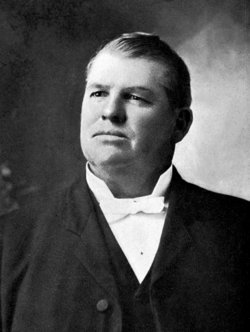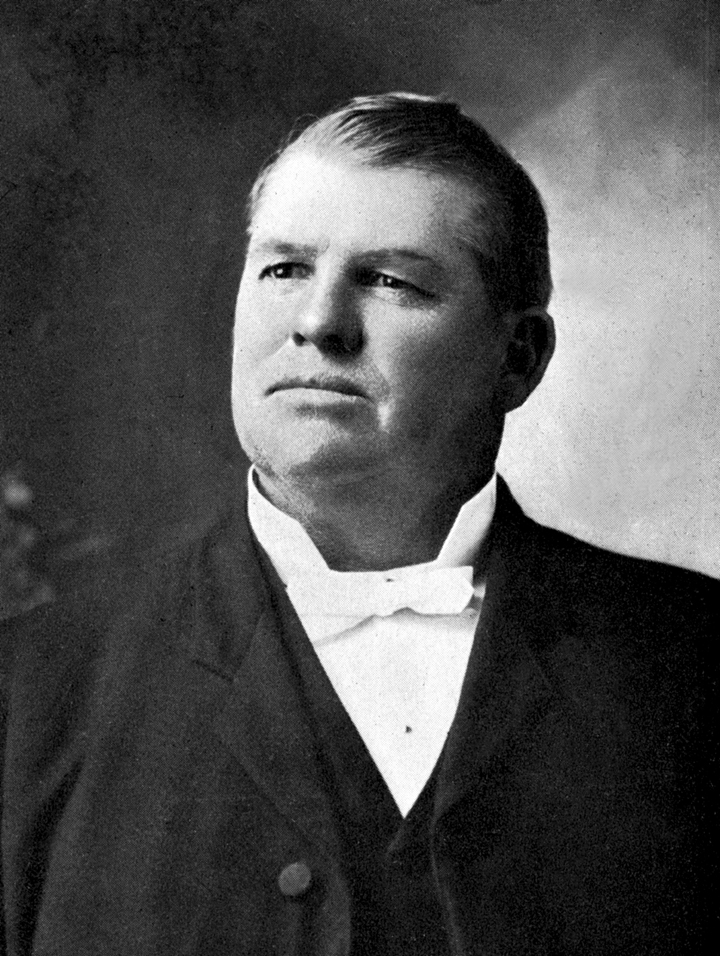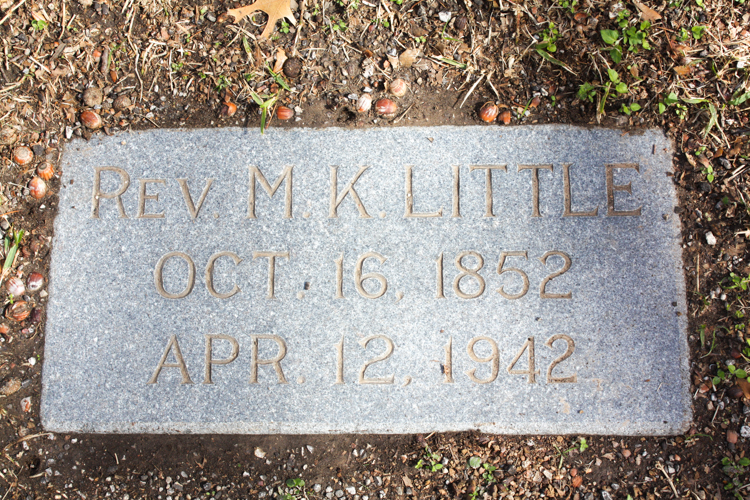He was known as Koger, M. K., Brother Little and by his grandchildren, Baugh. He was licensed to preach in 1874 and soon afterward in 1876 he and his wife moved to Texas. He was admitted "on trial" to the Northwest Conference of the Methodist Church. For nearly half a century, he was an active pastor and presiding elder (District Superintendent) filling church appointments throughout northwest Texas. In Fort Worth about 1889, he turned one of the first shovels of dirt for the Methodist College, now known as Texas Wesleyan College. During the period from 1890 to 1894 he covered an area now in fifty-four counties in the Texas Panhandle. Koger is quoted in "A History of the Expansion of Methodism in Texas: 1867-1902" telling of his experiences in the Panhandle.
"I went out to Vernon in the fall of 1890 with my family. After about three months we had a very good district parsonage in which to live. I procured a hack and a team with which to cover that territory, as I had to carry not only camp equipment and my own provisions, but feed for my horses as well. I kept account on one round, as well as could be estimated, and at the windup I had travelled 1,900 miles. There were scarcely any roads. I just took a course, and if I came to a barbed wire fence, as I did sometimes, fifty miles long, I had tools along for that business and I took the fence down, crossed over, and put it back up again."
"I always carried my Winchester with me and never felt the need of it, except to kill game for food, but one time. This was when I was driving through a narrow defile in the Kiowa Country in Green County and an Indian stepped out in front of my team and stopped them. What his intentions were I did not know, but I could see he was up to no good. I instantly reached back for my Winchester and brought it forward and caught the Indian's eye with mine and held it, determined to out-gaze him. I suppose that we stared at each other for three or four minutes without a word, when he dropped his eyes to the ground and I knew I had out-nerved him. About that moment another Indian jumped out, grabbed the first one and pulled him out of my path. I touched my horses and they broke into a run, and I let them run full tilt about three miles before I pulled them up."
Koger's obituary in the Fort Worth Star-Telegram reported "In his half century of service as a minister, Rev. M. Little received 4,400 members and performed 440 marriage ceremonies. The number converted under his preaching could hardly be estimated. The birth places of his children give an indication of the scope of his service." He retired from the active ministry in 1922, the same year his beloved wife died. Thereafter he was often called upon to baptize babies, perform marriages and preach. When he died at the age of 89 he left a half-finished sermon on his desk. He had wanted to be prepared so that the next time he was invited to preach he would have a fresh sermon.
He was known as Koger, M. K., Brother Little and by his grandchildren, Baugh. He was licensed to preach in 1874 and soon afterward in 1876 he and his wife moved to Texas. He was admitted "on trial" to the Northwest Conference of the Methodist Church. For nearly half a century, he was an active pastor and presiding elder (District Superintendent) filling church appointments throughout northwest Texas. In Fort Worth about 1889, he turned one of the first shovels of dirt for the Methodist College, now known as Texas Wesleyan College. During the period from 1890 to 1894 he covered an area now in fifty-four counties in the Texas Panhandle. Koger is quoted in "A History of the Expansion of Methodism in Texas: 1867-1902" telling of his experiences in the Panhandle.
"I went out to Vernon in the fall of 1890 with my family. After about three months we had a very good district parsonage in which to live. I procured a hack and a team with which to cover that territory, as I had to carry not only camp equipment and my own provisions, but feed for my horses as well. I kept account on one round, as well as could be estimated, and at the windup I had travelled 1,900 miles. There were scarcely any roads. I just took a course, and if I came to a barbed wire fence, as I did sometimes, fifty miles long, I had tools along for that business and I took the fence down, crossed over, and put it back up again."
"I always carried my Winchester with me and never felt the need of it, except to kill game for food, but one time. This was when I was driving through a narrow defile in the Kiowa Country in Green County and an Indian stepped out in front of my team and stopped them. What his intentions were I did not know, but I could see he was up to no good. I instantly reached back for my Winchester and brought it forward and caught the Indian's eye with mine and held it, determined to out-gaze him. I suppose that we stared at each other for three or four minutes without a word, when he dropped his eyes to the ground and I knew I had out-nerved him. About that moment another Indian jumped out, grabbed the first one and pulled him out of my path. I touched my horses and they broke into a run, and I let them run full tilt about three miles before I pulled them up."
Koger's obituary in the Fort Worth Star-Telegram reported "In his half century of service as a minister, Rev. M. Little received 4,400 members and performed 440 marriage ceremonies. The number converted under his preaching could hardly be estimated. The birth places of his children give an indication of the scope of his service." He retired from the active ministry in 1922, the same year his beloved wife died. Thereafter he was often called upon to baptize babies, perform marriages and preach. When he died at the age of 89 he left a half-finished sermon on his desk. He had wanted to be prepared so that the next time he was invited to preach he would have a fresh sermon.
Family Members
-
![]()
Malissa C Little
1851–1851
-
![]()
Mary Elizabeth Little Hill
1854–1935
-
![]()
Thomas Perry Little
1855–1924
-
![]()
George Washington Little
1857–1901
-
![]()
Ira Green "Bud" Little
1859–1935
-
![]()
Celia Cathrine Little Mize
1860–1952
-
![]()
Rubin LaFayette "Ruby" Little
1861–1946
-
Cynthia Ann Little Sims
1864–1937
-
![]()
James Rufus Little
1865–1914
-
![]()
Emrey Felix Little
1868–1946
Sponsored by Ancestry
Advertisement
Records on Ancestry
Advertisement

























